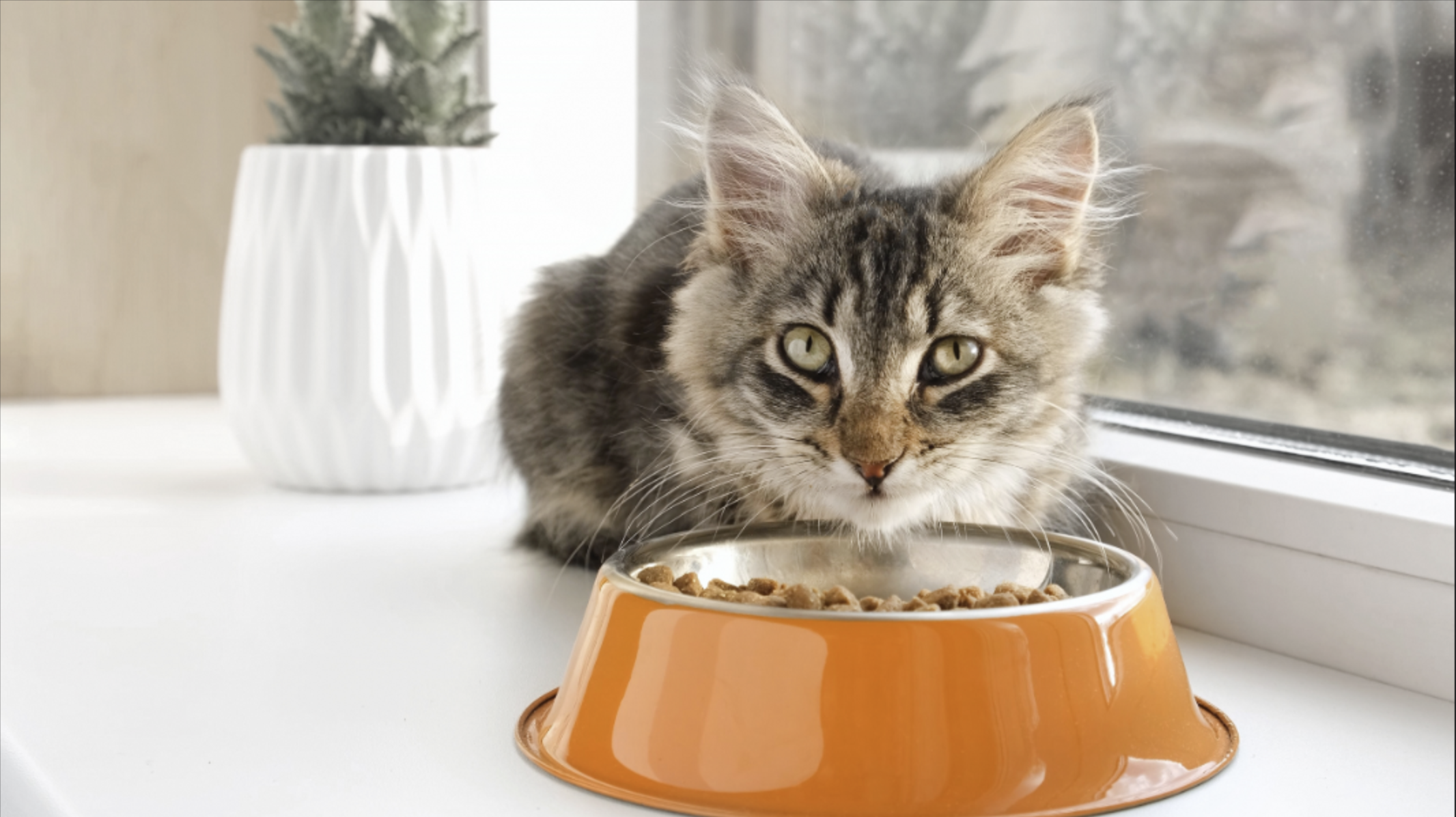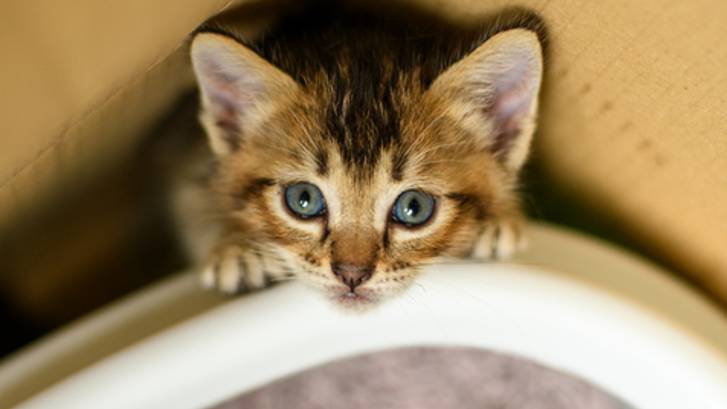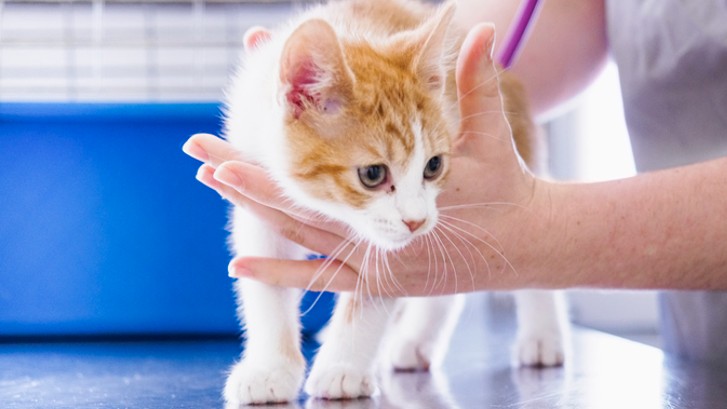Kitten not eating: An experts’ guide to causes and treatment
Help a kitten not eating to regain their appetite with expert advice and tips

Discovering a kitten not eating is a great concern. Will the poor little furbaby become really hungry or suffer ill-health and is it a symptom of something serious? In general, a healthy kitten should be eating at least three or four times a day so anything less can lead to problems. The key is knowing when to spot the signs early and when you need to seek veterinary assistance.
If a kitten does not eat for more than 24 hours, they run the risk of becoming dehydrated and malnourished. They may also begin to suffer other health complications. Early signs tend to be a change in normal behavior. You may spot your kitten pacing or howling more than usual or discover they’ve lost interest in the best cat toys.
Sometimes kittens can be more sleepy or show stark signs of ill-health such as an upset stomach presenting as vomiting or diarrhea. In some cases, a cat is throwing up food after eating. If this is happening, then a trip to the vet is usually the best way forward since a physical examination and blood and stool tests can get to the root of the problem.
So let’s explore the issue of a kitten not eating in greater detail with the help of vets Elizabeth Racine and Diana Hasler as well as certified animal behaviorist Caroline Wilkinson. They explore how much food should a kitten eat?, share thoughts about why your kitten may have stopped eating and give top tips to get them back to the bowl.

Dr Elizabeth Racine graduated in 2017 as a Doctor of Veterinary Medicine. She now specializes in veterinary behavior, nutrition, and internal medicine. Dr Racine also works as a freelance writer, writing for major companies in the industry such as the American Kennel Club.
What to do if your kitten won't eat
Making adjustments to a kitten’s food or environment can help, the idea being that you’re looking to entice your kitty to eat. With a set of kitten feeding tips to hand, you may be able to get your beloved bundle eating once more.
1. Try offering different foods
Offering a mix of wet and dry food, including different flavors and textures, can entice your kitten to eat. It’s worth following our two vets’ guide to the 12 best kitten foods for an idea of the types of meals and kibble you should be looking out for. But, in general, you may find your kitten loves pate food or will only eat if the food has gravy. You could also try warming food up in the microwave, being careful not to make it too hot. Use your finger for hot spots which could burn your kitten’s mouth. You can also try foods kittens can eat besides cat food.
Get the best advice, tips and top tech for your beloved Pets
2. Feed your kitten in a quiet space
Consider feeding your kitten alone in a quiet room or leaving food out overnight. Some cats are nervous or shy and may not eat with people or other animals around. You may find that once everyone is asleep and the house is quiet, she will venture out to eat by herself.
3. Ensure their food bowl is clean
Leftover food bits can quickly grow bacteria and mold, making for a very unappetizing meal! Consider buying the best cat food bowl – one that’s wide and shallow so it will be easy for your kitten to access. Wash it with dish soap and warm water after each meal.
When to worry about a kitten not eating

It's vital that you contact your vet if your kitten does not eat within 24 hours, even if water is being consumed. If your kitten is under six-weeks-old, has stopped eating and shows signs of illness, contact your veterinarian immediately. They are at particular risk of hypoglycemia, or low blood sugar at that age, if they do not eat regularly.
Signs of hypoglycemia include loss of appetite, weakness, stumbling, falling over, disorientation, vomiting, diarrhea, seizures, and death. If you suspect your kitten may be hypoglycemic, rub some karo syrup, honey, or even maple syrup onto your kitten’s gums and take her to a veterinarian immediately.
“Proper nutrition is important throughout a cat’s life and is especially critical during kittenhood,” according to the MSD Veterinary Manual. “Growing kittens need more calories, fat, protein, vitamins, and minerals to meet their needs for rapid growth and development”.
But how often should I feed my kitten? Well, the answer is multiple times per day so if your kitten is failing to eat any of those meals over a 24-hour period, it’s a good indication of a problem – more so if your kitten, of any age, has any other symptoms of illness, such as vomiting, diarrhea, lethargy, or abdominal pain.
Diagnosing your kitten
Your veterinarian will perform a full physical examination, including listening to your kitten’s heart and lungs and palpating your kitten’s abdomen to feel for any abnormalities. Your veterinarian will likely also want to perform some diagnostic tests such as blood work, radiographs (x-rays) of your kitten’s abdomen, or evaluation of a fecal sample to rule out parasites.
This will help your veterinarian rule out common causes for your kitten to stop eating. If an underlying cause for your kitten’s loss of appetite is identified, your veterinarian will prescribe an appropriate treatment plan to help get your kitten back on track.
Sometimes, no underlying cause is identified to explain your kitten’s change in appetite. In this case, your veterinarian may prescribe medication to address the symptoms. This may include a medication to alleviate nausea, an appetite stimulant, an antacid, or even intravenous (IV) or subcutaneous (SQ) fluids to help keep your kitten hydrated. Be sure to follow your veterinarian’s instructions closely, and let your vet know if your kitten does not improve on the medications.
Treating your kitten at home

Although it may be tempting to try home remedies or over-the-counter medications for your kitten, this is not a good idea. Many of these “treatments” are unhelpful at best and toxic at worst. Your kitten is fragile and cannot tolerate new supplements at this time. Many over-the-counter and other human medications are also toxic to cats and can be very dangerous to your kitten. In general, you should never use a home remedy or medication without first consulting your veterinarian.
With your veterinarian’s help – and maybe a little trial and error – you’ll hopefully see your kitten back at the food dish in no time. Remember that too many diet changes can cause an upset stomach, so transition gradually if you're going to be changing cat food. Be sure to keep an eye on your kitten’s appetite, and see your veterinarian if any further episodes of not eating occur. Most importantly, enjoy all the fun there is to be had during kittenhood!
Read next: Why is my kitten always hungry?

Caroline Wilkinson is a Certified Animal Behaviorist. She is a Full (assessed) Member of the APDT and INTODogs – as well as a Registered Training Instructor (ABTC). Caroline is also a Certified Real Dog Yoga Practitioner and an Applied Canine Zoopharmacognosist.

Dr. Diana Hasler graduated with distinction from the University of Edinburgh Royal (Dick) School of Veterinary Studies in 2018. She has experience working as a small animal veterinarian in general practice, where she has treated many dogs, cats, rabbits, and rodents.
Want to learn more about kitten appetites? Discover how long should cats eat for? and how to stop your kitten eating litter.
Dr. Elizabeth Racine is a small animal general practice vet covering all things pet health and wellness. Her special interests include veterinary behavior, nutrition, and internal medicine.
As a freelance writer, Dr. Racine has written content for major companies in the industry such as the American Kennel Club, Merck Animal Health, Bayer PetBasics, Elanco, and CareCredit. In her free time, Dr. Racine enjoys playing trampoline dodgeball, hiking with her beagle Dasher, and spending time with her three mischievous cats.
- Caroline WilkinsonCertified Animal Behaviorist
- Dr. Diana Hasler BVM&S MRCVSVet
